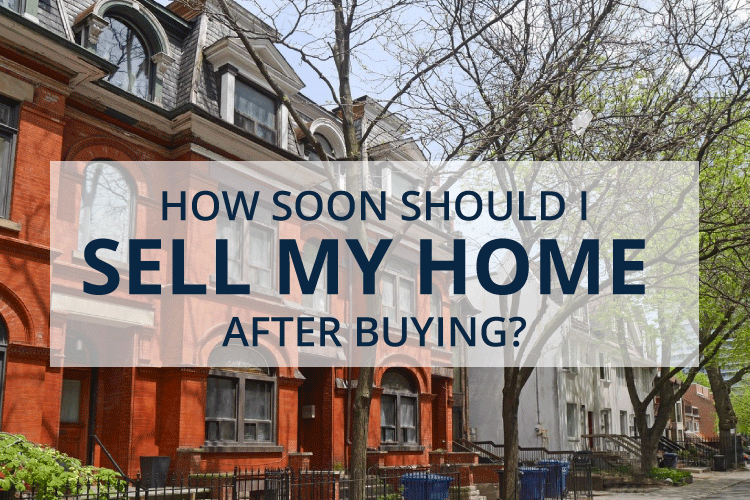If this is your first rodeo in the real estate industry, listen up. Do not sell your new home immediately after buying it. Unless there’s an emergency – there’s almost no good reason for you to put your new home for sale immediately!
Table of Contents
Forget market conditions for a minute. Forget all the news headlines. If your goal is to build wealth [not just money], you need to hold your property to allow it to build equity.
There’s a time for everything. In real estate, the best time to sell your property is after holding it for 3-5 years – at least! Take my advice for what it’s worth but I have been working in this industry for nearly two decades now. I have facilitated real estate transactions worth over $500 million. In my experience, if you’re in this industry for the long term, instead of spending your time and resources learning how to flip a condo, learn how to leverage your home equity to invest or buy another property in your name!
This blog isn’t about home equity [I have others linked in case you’re interested]. Instead, it focuses on helping you set up a realistic selling timeline for your investments. I also break down some rules and regulations in Ontario that can potentially influence your home sale!
Get Your Selling Timeline Right!
Why You Shouldn’t Sell Your House Shortly After Buying It?
Real estate is a long-term investment. Traditionally, the longer you hold your investment, the more money you will make. In my experience, this holds true even today!
If you are buying a property with the intention of selling, chances are your timeline is too short. That’s simply because the math doesn’t add up. Toronto’s housing market typically appreciates 5% per year. Your cost to sell – including closing costs – will account for about 10% of the property price. In this hypothetical [yet real] scenario, you would need to hold your property for a minimum of two years to break even.
This is why I recommend all my clients not to buy a property based on things they see or hear in the news. Unless you’re informed about the laws and costs involved in selling a home, it’s hard to succeed in the long term.
If you’re really interested in building a profitable real estate investment portfolio, consult one of the many real estate professionals in your city to learn about the market before putting your hard-earned money into it! You can book a free call with me or somebody from my team and we’d be happy to look at or help you build your real estate investment portfolio from scratch!
How Do You Determine When’s The Right Time To Sell Your Property?
Deciding the optimal time to sell your home shortly after purchasing it in Ontario requires careful consideration. Factors such as market conditions, property demand, and your personal financial goals should be taken into account. Monitoring local real estate trends, consulting with real estate agents, and assessing your own financial situation can help you make an informed decision. It’s advisable to evaluate whether you can recoup your initial investment and consider any potential losses before listing your home for sale.
How Soon Can You Sell Your House After Buying It In Ontario?
You can sell your house immediately after buying it in Ontario. After closing, once you have the keys to the property in your hand, you can sell it whenever you want – with or without using the services of a real estate agent.
But unless you know what you’re doing, you shouldn’t. With Canada’s new anti-flipping taxation laws in effect from January 1st, 2023, it’s going to be a lot harder to make money in real estate – unless you plan on holding your investments for the long term!
Related: 6 Reasons Why You Should Work With A Real Estate Agent
Should You Sell Your Home 1 Year After Purchasing It?
Should you? Ideally, no. But can you sell your home 1 year after purchasing it? Yes, you definitely can. Unless you’re profitable or in dire need of funds, avoid selling your property before holding it for at least 2 years. I tell all my clients to hold their investments for at least 3-5 years.
If you’re looking to make some money to cover your mortgage payment, consider renting out your unit for the first two years of ownership. Then, once it appreciates enough, you can go ahead and sell it.
Another thing to keep in mind this year is the changes to the capital gains tax and the introduction of the new anti-flipping taxation laws. As per these new rules, it’s a lot harder to exempt yourself from paying the capital gains tax even if you’re selling your primary residence!
Should You Sell Your Home 2 Years After Purchasing It?
Yes, 2 years gives your property enough time to appreciate and build equity. By then, you should be able to use your current home equity to purchase a new home – possibly in a better, more desirable neighbourhood. If you still can’t purchase the home of your dreams, wait a little more.
Related: Toronto Housing Market Forecast For 2023 & Beyond
When Does It Make Sense To Sell Your House Early?
I know. I have repeated this multiple times. It doesn’t make sense to sell your house early but I also said that this is a nuanced business. In some cases, it does make sense to sell your house early – especially when it’s profitable to do so!
For example, if you’ve bought a property and made renovations to it to increase its value – you could easily sell it priced above market value almost immediately. Similarly, if the market conditions in your neighbourhood have improved exponentially, this could prompt you to capitalize on the rise and sell your property quickly. This happens but not very often. I do not recommend buying a unit in an up-and-coming neighbourhood with the sole objective of flipping it quickly as it’s a very risky strategy!
Penalties For Selling A House Shortly After Buying In Ontario
Until last year, homeowners in Ontario selling their primary residence were exempt from paying 50% capital gains tax levied on the profits generated from a home sale. You can still apply for an exemption today but if you’re selling a property that you just bought within the last year, you will likely have to pay the capital gains tax.
In the past, only real estate investors were liable to pay a capital gain tax on the profits from real estate sales. Since 1st January 2023, things have changed.
Are There Any Penalties For Selling Your Home Quickly In Ontario?
Yes, you can say that there are two types of penalties that can cost you if you do end up selling your home too quickly in Ontario. If you sell your property within 1 year of buying it, you will be liable to pay 50% of your profits to the government as capital gains tax. Next, if you’ve taken a mortgage to help you purchase the property that you now plan to sell, your mortgage lender may charge you a pre-payment penalty.
Will You Have To Pay Off Your Mortgage When You Sell Your Home?
Technically, yes. When you sell a property that you’ve taken a mortgage to purchase, all the proceeds from the sale will first go towards clearing off your existing mortgage payments. Your mortgage lender may charge you a prepayment penalty if you are thinking about selling your home before the term of your mortgage expires. This is a fee that some lenders charge if you pay off some or all of your mortgage early. Usually, the prepayment penalty is agreed upon when you have closed on your home and is typically either 3 months of interest or interest rate differential (IRD) which is a calculation that the lender will make based on the amount left on the term of your mortgage, your interest rate, and the amount of your outstanding loan. Each lender’s prepayment penalty is calculated differently so it is important to contact your lender to figure out exact costs if you are looking to sell.
Final Words
This is a loaded topic. I might have missed out on something important so if you’re keen on learning more, there are tons of resources available online. Read up and spend some time educating yourself. Learning about the rules, taxation laws and real estate market conditions should help you set up realistic selling timelines for your investments. But that isn’t necessary if you loop in the right professionals, reach out to my team and your accountant to get all the facts and walk you through.
Real estate is an expensive asset. Every mistake counts and sometimes, hurts, too! I have made a lot of mistakes that you won’t need to make ever. If you need some help to sell your property in Toronto, book a free call with me or somebody from my team. Rest assured, your investment will be in safe hands, geared for profitability. I am not just saying that I meant it. You can go through some of my clients’ returns and see so yourself!

Pierre Carapetian
Pierre Carapetian is the Broker Of Record for Pierre Carapetian Group Realty with over 12 years of experience in the real estate market. As a proud Torontonian and real estate broker, he prides himself on knowing this city inside out. He started investing at the age of 18 and has facilitated over half a billion dollars in real estate transactions.
FREQUENTLY ASKED QUESTIONS
In Ontario, homeowners are legally allowed to sell their property immediately after purchase. However, to optimize return on investment and avoid financial pitfalls, strategic timing is crucial. Delve into how timing can impact your financial outcome and offers expert advice on market conditions that influence the best time to sell.
Selling your home shortly after purchase can lead to significant financial consequences, including capital gains tax and potential mortgage penalties. These costs can diminish the profits from the sale. Contact us to explore these financial implications in detail, providing a thorough analysis to help homeowners make informed decisions.
Holding onto your property for 3-5 years is generally recommended to allow for appreciation and to absorb the initial transaction costs effectively. This period can significantly enhance the equity built in the home, making it a more profitable investment. Our team can help explain the economic and market-driven reasons behind this strategy, offering insights into how a longer holding period can benefit homeowners.
Recent legislation in Canada has introduced anti-flipping taxes aimed at discouraging the quick resale of properties. These laws can heavily influence your decision to sell, especially if the property was purchased recently. The blog provides a comprehensive overview of these laws, detailing how they might impact your selling strategy and overall financial planning.


